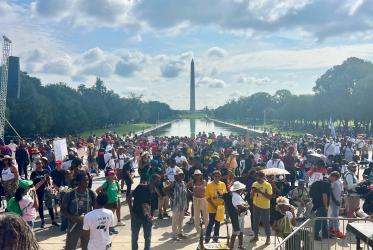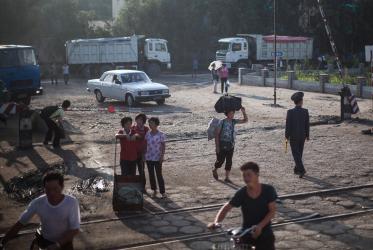The World Council of Churches welcomes the historic meetings on 5-6 March between a South Korean special envoy delegation and the North Korean leadership in Pyongyang – the first high-level direct talks between the two Koreas in more than a decade. The reported outcomes of those meetings are powerful signs of hope compared to dangerously escalating tensions and military confrontation of the recent past, and provide major encouragement to President Moon Jae-in’s diplomatic engagement with the North.
These developments took place while representatives of Korean churches and international partners – including the World Council of Churches – were gathered together in a conference organized by the National Council of Churches in Korea (NCCK) in Seoul on the 30th anniversary of the NCCK 1988 Declaration of the Churches of Korea on National Reunification and Peace. Peter Prove, WCC director of the Commission of the Churches on International Affairs, was attending the conference.
As a result of agreements reached in the high-level meetings in Pyongyang, the two Koreas will hold a summit at the border village of Panmunjeom at the end of April, and a hotline for communication between the two sides’ leaders will be established.
Among other very significant outcomes, it is reported that North Korea will cease nuclear and missile tests while dialogue takes place, that the DPRK leadership indicated a willingness to discuss denuclearization, and that they see no need to retain nuclear weapons if the security of the country and its regime is otherwise assured. In addition, the DPRK is ready to engage in talks with the USA on these matters, and to normalize North Korea-US relations.
These developments, following the PyeongChang Olympic Truce, provide significant momentum for peaceful transformation of the crisis on the Korean Peninsula, and great inspiration for the churches’ efforts for peace and reconciliation. We express our appreciation for the commitment and effective action of the government of President Moon Jae-in in taking new initiatives for dialogue with the DPRK, and reaffirm the support and encouragement of the ecumenical movement for dialogue as the only viable path to peace and reconciliation in the region.
The WCC joins the participants in the NCCK conference in calling for the international community, and especially the United States of America, to respond affirmatively to these signs of hope, with reciprocal tension-reducing and trust-building measures.


